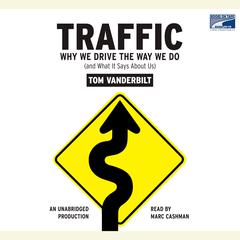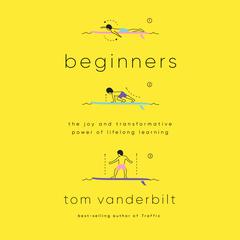 Play Audiobook Sample
Play Audiobook Sample
You May Also Like: Taste in an Age of Endless Choice Audiobook
 Play Audiobook Sample
Play Audiobook Sample
Quick Stats About this Audiobook
Total Audiobook Chapters:
Longest Chapter Length:
Shortest Chapter Length:
Average Chapter Length:
Audiobooks by this Author:
Publisher Description
Why do we get so embarrassed when a colleague wears the same shirt? Why do we eat the same thing for breakfast every day, but seek out novelty at lunch and dinner? How has streaming changed the way Netflix makes recommendations? Why do people think the music of their youth is the best? How can you spot a fake review on Yelp?
Our preferences and opinions are constantly being shaped by countless forces – especially in the digital age with its nonstop procession of “thumbs up” and “likes” and “stars.” Tom Vanderbilt, bestselling author of Traffic, explains why we like the things we like, why we hate the things we hate, and what all this tell us about ourselves.
With a voracious curiosity, Vanderbilt stalks the elusive beast of taste, probing research in psychology, marketing, and neuroscience to answer myriad complex and fascinating questions. If you’ve ever wondered how Netflix recommends movies or why books often see a sudden decline in Amazon ratings after they win a major prize, Tom Vanderbilt has answers to these questions and many more that you’ve probably never thought to ask.
From the Hardcover edition.
Download and start listening now!
"A brave and timely investigation… engulfed as we are by an ocean of science and punditry that presents human behaviour as something that can be codified, predicted and even synthesized. Swimming cheerfully against that tide, Vanderbilt makes a compelling case that most of our choice-making defies those attempts. The nature of taste in fact remains stubbornly mysterious, despite our compulsion to exercise it – and despite how that compulsion increasingly shapes modern life… Clever… Persuasive and personal. There’s no judgment here. The author leaves that job to us."
— Bruce Philp, National Post
Quotes
-
“A tour through the world of human preferences and the companies that try to divine them… [Vanderbilt is an] amiable and thorough guide.”
— New York Times Book Review -
[A] lively, wide-ranging study… The footnotes have a David Foster Wallace-like wit as Vanderbilt calls our attention to such issues as whether people find donuts less yummy if they taste them in a salmon cannery and whether rats enjoy grape Kool-Aid more if it is infused directly into their stomachs… Convincing… Quite funny… Clear and engaging… He is to be commended for the sheer range of material he makes accessible.
— Lisa Zeidner, The Washington Post -
To answer an age-old question – ‘Why do we like the things we like?
— Vanderbilt navigates philosophy, economics, psychology, neurology and data science… As Vanderbilt explores the enigmatic forces driving these decisions, he paints an engaging, multilayered… picture of taste. -
Bounces the insights of modern data scientists off the work of generations of critics, economists, neuroscientists, philosophers, psychologists, and sociologists. Taste, we learn, is an extremely relative phenomenon currently swerving through an age of extreme relativity… [Vanderbilt’s] key takeaway is that taste remains a complex and erratic phenomenon that’s endlessly shifting according to environmental, physical, and social pressures… Vanderbilt is a skillful synthesizer, and You May Also Like is full of unexpected connections.
— Felix Gillette, Bloomberg -
A tour through the world of human preferences and the companies that try to divine them… [Vanderbilt is an] amiable and thorough guide to a subject that can get either fussy or murky fairly quickly, and he has an obsessive determination to get to the bottom of something we exercise so often and unthinkingly we tend to take it for granted.
— Jennifer Szalai, The New York Times Book Review -
Vanderbilt is an intelligent writer, and there is a lot of interesting material in “You May Also Like”… Intrepid…Vanderbilt is able to identify two factors that have repeatedly been shown to have a significant influence on taste. One is social consensus; the other is familiarity. We get attracted to things that we see other people are attracted to, and we like things more the longer we like them.
— Louis Menand, The New Yorker -
You May Also Like sets out to understand this mysterious phenomenon of how our preferences change and come to be…the book moves on a whirlwind tour of taste across its many domains, from food and music to color and even cats… [Assembles] a constellation of insights that resonate with one another, each serving to reveal another joint or detail of the bigger picture… Passionate… Enormously refreshing.
— Sheena Iyengar, Science Magazine -
Essential for readers who are interested in getting a glimpse of the decision-making process at influential online media companies, as well as those who are interested in the processes that govern individual preferences and taste making.
— Library Journal -
“Entertaining… Extremely convincing… There’s much to behold in this exhaustively researched, intellectual assessment of human preference.
— Kirkus Reviews -
An intensive investigation of what we like, why we like it and why sometimes it’s so hard to decide… Vanderbilt delivers the explanations with ample documentation and enough humorous asides to make his book deliciously palatable the whole way through.
— Sheila M. Trask, BookPage -
The danger in reading You May Also Like is that when you finally put Tom Vanderbilt’s book down, you probably think he's just made you the most interesting person in the room.
— Faith Salie, author Approval Junkie and panelist of NPR's Wait, Wait, Don't Tell Me! -
“We live in an age of bewildering choice, yet we are the sum total of our decisions. You May Also Like is my favorite kind of book— surprising, smart, and superbly researched. It tackles that most mysterious of subjects: what make us tick.
— Terry O’Reilly, author of The Age of Persuasion and host of CBC radio show Under the Influence -
A fascinating romp through the mysteries of taste.
— Susan Pinker, author of The Sexual Paradox and The Village Effect -
You May Also Like is the best kind of science writing — deeply reported and researched, a witty investigation that’s precisely to my taste.
— Clive Thompson, author of Smarter Than You Think -
Vanderbilt's fascinating foray into the world of tastes and why they exist makes for a book that's well worth reading...a light, informative read, and one that's thoroughly enjoyable and highly recommended.
— Sandy Clark, The Star -
Convincing…Quite funny…He is to be commended for the sheer range of material he makes accessible.”
— Washington Post -
“[Assembles] a constellation of insights that resonate with one another, each serving to reveal another joint or detail of the bigger picture…Enormously refreshing.”
— Science -
“Navigates philosophy, economics, psychology, neurology and data science…[and] paints an engaging, multilayered…picture of taste.”
— Globe and Mail (Toronto) -
“A fascinating exploration of personal preferences in our digital age.”
— BookPage -
“Will cause readers to think twice before clicking ‘like’ on Facebook, rating a film on Netflix, or ordering what the server says is the menu’s most popular item.”
— Publishers Weekly -
“[An] exploration of how human preferences emerge…that takes readers into the offices of companies such as Netflix, Pandora, and Spotify.”
— Library Journal -
“There’s much to behold in this exhaustively researched, intellectual assessment of human preference.”
— Kirkus Reviews -
“Narrator Jeffrey Kafer’s natural articulation and documentary speaking style work well for a pop science title. He’s engaged without sounding overly passionate or promotional…His overall performance is so right for this material.”
— AudioFile
Awards
-
A BookPage Top Pick for May 2016
-
A New York Times Bestseller in Nonfiction
You May Also Like Listener Reviews
Be the first to write a review about this audiobook!
About Tom Vanderbilt
Tom Vanderbilt is the author of several books, including You May Also Like: Taste in an Age of Endless Choice; Traffic: Why We Drive the Way We Do (and What It Says about Us); and Survival City: Adventures among the Ruins of Atomic America. He has written for many publications, including the New York Times Magazine, Popular Science, Smithsonian, and London Review of Books, among many others. He is a contributing editor of Wired UK, Outside, and Artforum. He has appeared on a wide range of television and radio programs, from the Today show to the BBC's World Service to NPR's Fresh Air. He has been a visiting scholar at New York University's Rudin Center for Transportation Policy and Management, a research fellow at the Canadian Centre for Architecture, a fellow at the Design Trust for Public Space, and a winner of the Warhol Foundation Arts Writers Grant, among other honors.
About Jeffrey Kafer
Jeffrey Kafer is an avid performer on the stage and in voice-overs. He has narrated over one hundred books spanning all genres, and he won the 2008 Voicey Award for Best New Voice.






